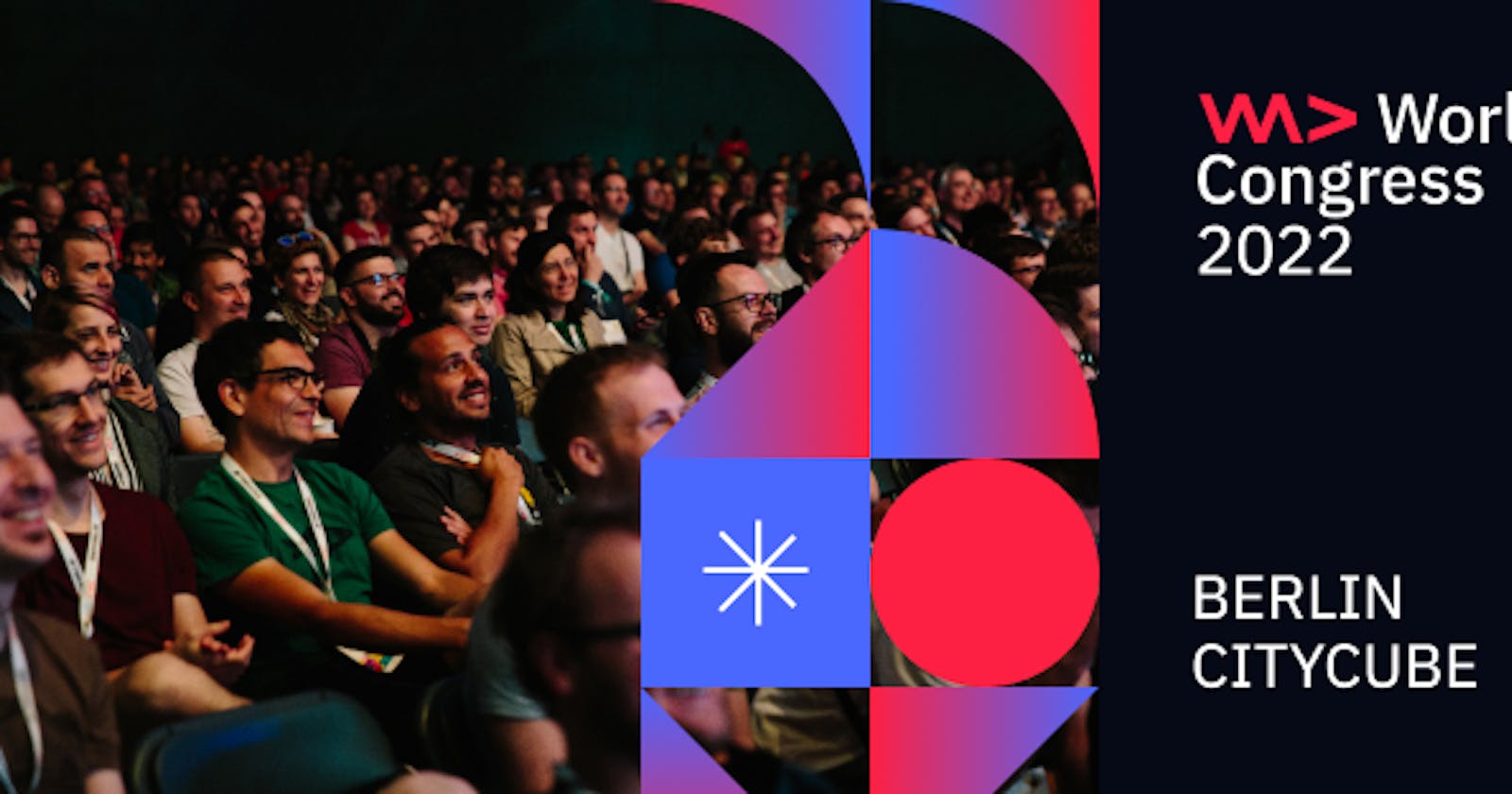We Are Developers Trip Report: Largest Conference you Might not Know
Had an amazing time speaking at Berlin yesterday. WAD is a huge conference that far exceeds the bare stats. Well worth the time!
Table of contents
As a developer advocate I speak at many conferences but never heard of We Are Developers before. Since the conference is relatively new it somehow didn't register on my radar the first couple of times around. This year I submitted a couple of talks and was lucky enough to get accepted as a speaker. It seemed like a nice conference. They had Woz so it's probably cool...
I still didn't get a sense of the scale of this conference was until I looked over the list of accepted speakers:
- Thomas Dohmke - CEO of github
- Joel Spolsky - to me always "Joel on Software" but for the younger crowd: co-founder of Stack Overflow! (and also Trello, Glitch, HASH)
- Bjarne Stroustrup - the guy that created C++ !
- Håkon Wium Lie - creator of CSS
- David Singleton - CTO of stripe
I'm cutting out a lot here since there were so many amazing speakers whose names you should probably know but the article will never end...
App and Registration
Even before arriving this conference was a bit different. It shipped a conference app, which isn't rare these days. What was rare is that it worked reasonably well... Shocking!
There's a point system there which I never fully figured out. I was pretty busy with other conferences in the previous week, so I probably skipped some of the communications. But the app had a pretty decent mini social feed that was open for participation and in it I could just post questions and provide feedback. This was pretty cool as I could ask the audience questions to gauge familiarity with the subjects I would be talking about. Obviously this isn't scientific but it gave me a bit of a sense and triggered some minor slide modifications.
I arrived to Berlin after a delayed flight and put my bags in the hotel then rushed to the venue to print the badge. That was one of the smoothest checkin experiences I had in a conference. The way it worked is this:
- In the app you enter your user profile where you see a QR code
- You walk up to an iPad standing on the checkin desk and point the QR code at the camera
- You get a badge and a conference bag!
Amazing!
No spelling out my name or hassle. It "just worked"!
BTW the conference bag is much better than the typical string bags you usually get and they gave away these really cute ducks...
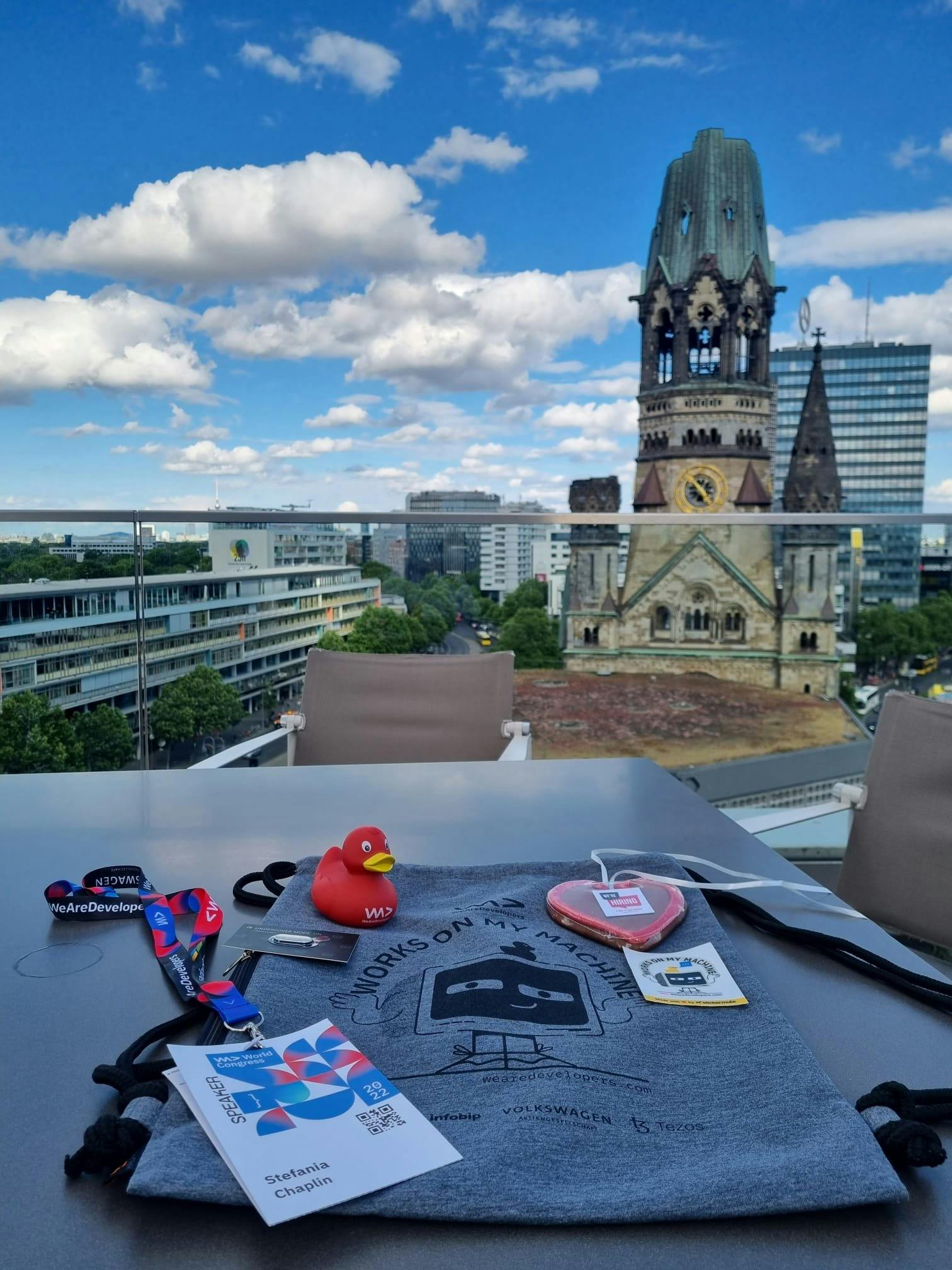
Photo by Stefania Chaplin.
From there I had to rush to the speaker dinner. The venue is located next to the train but since this is my first time in Berlin I just used Uber since the distance was so big. The venue is huge and isn't next to the hotels where most of the events took place.
Because of the size of the conference all speakers were in different hotels and everyone was a bit far from the venue itself. This has some drawbacks but has one advantage: after we finish talking we stay at the venue... Otherwise speakers sometimes just go to their hotel room instead of mingling. This meant that I got to talk to many of these great speakers!
Speaker Dinner
The speaker dinner was in "Motel One" in the center of Berlin. It was a great venue and was attended by many interesting people. I got a chance to talk to the creators of the conference. This was very interesting as I'm organizing a tech conference as well and this was very educational to me.
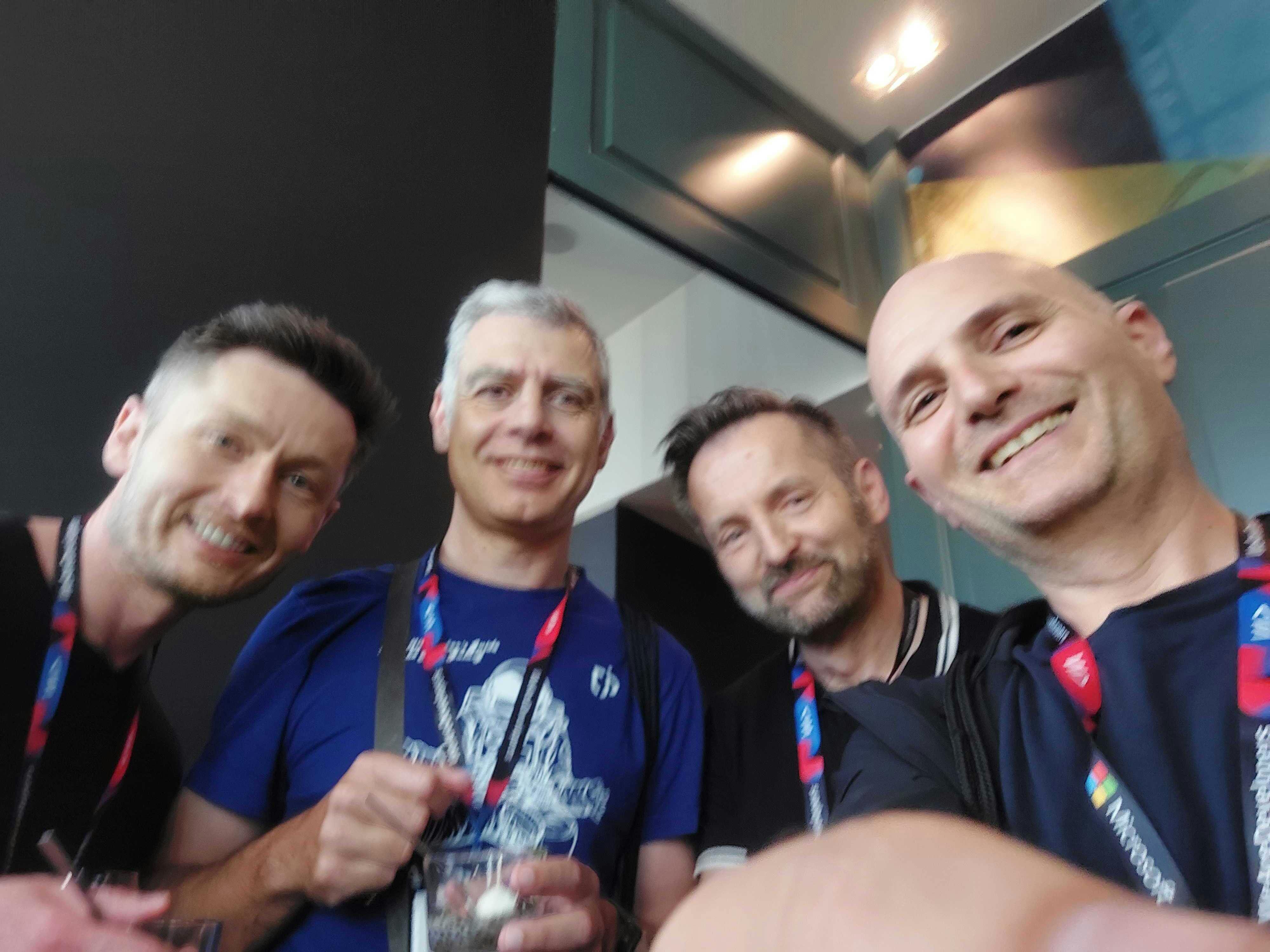
Also got to meet friends whom I never met "in person" which was great!
The speaker dinner felt "intimate" and not much bigger than typical conferences. It didn't correlate to the immense size of the event. That's a good thing...
Day 1
The first day opened with a great keynote by the CEO of github, Thomas Dohmke. He talked quite a bit about AI and the value of copilot. He also had an issue with the laptop connection and a great moment where tech support came on stage to help.
The audience was amused and clapped with support. That's how you know the demo is live...
The talk itself was OK but mostly high level for the general audience.
Next I had Ivar Grimstad's talk "Get Ready for Jakarta EE 10!" on my agenda. Unfortunately I missed most of it because I was just unprepared for the huge crowds and got lost in the size of the event. I hope to catch the full talk in some other venue or just stream it.
In fact the scale of the event and the number of concurrent talks made it so difficult I had a hard time finding the right talk. I wanted to go to Tal Joffe's "Building software that scales with Typescript". He's a smart guy and I'm sure I would have learned a lot. But I really wanted to see "Evolving your APIs, a step-by-step approach" by Nicolas Frankel which was apparently scheduled to a tiny room that was hard to find. By the time I got there the room was overflowing and security wouldn't let anyone else in.
So I ended up missing both talks. Ugh.
Kubernetes Native Java
My first success was the Josh Long talk "Kubernetes Native Java". It was a great talk. Very few people can fluidly live demo while talking like that. It's an amazing skill. The demo itself was pretty impressive in its terseness. He coded a full fledged spring REST demo with so little code...
Python would be impressed!
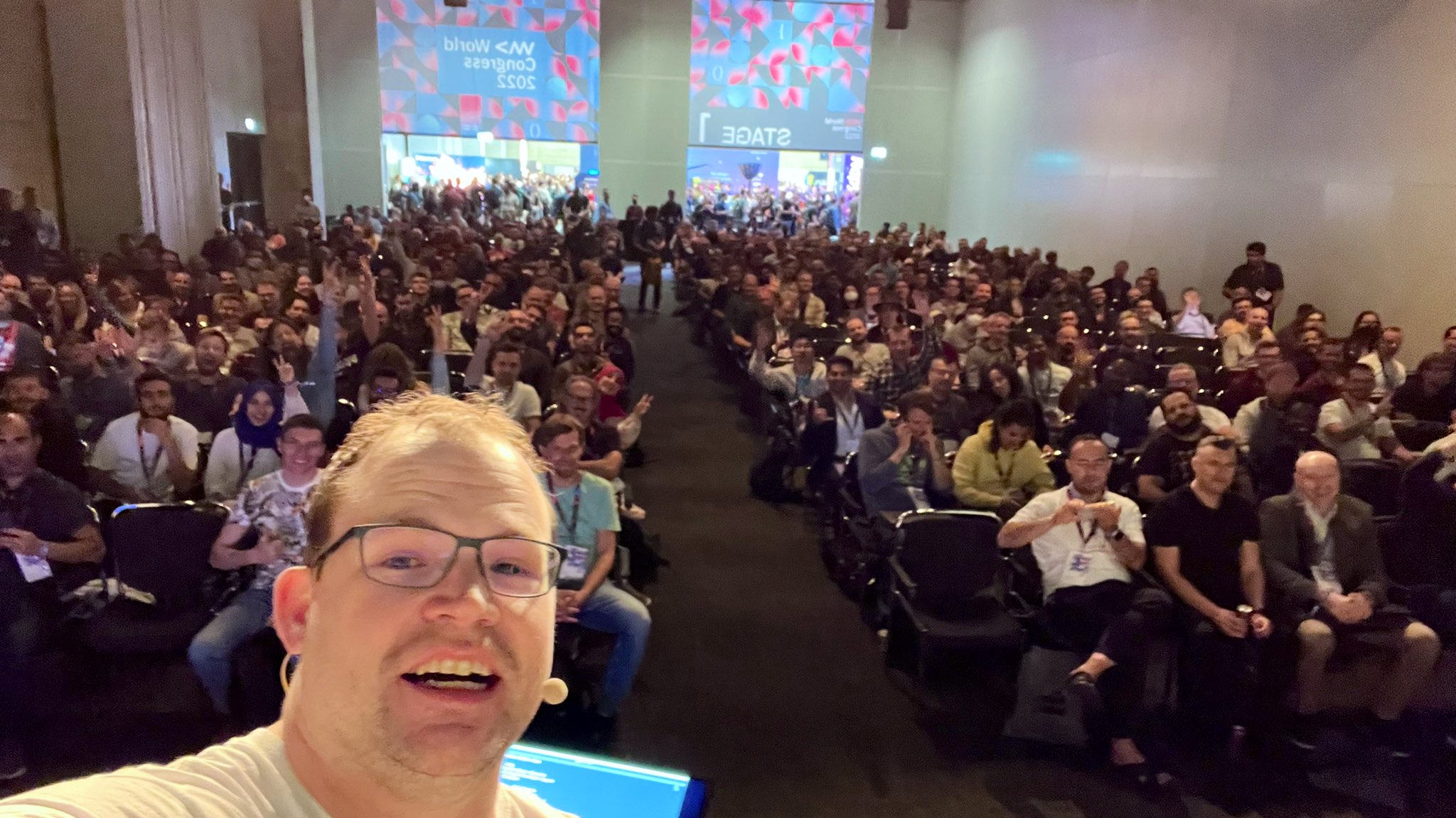
I'm on the front row here but to the left so just outside of the frame...
After the talk I came over to say hello. Josh is a super sweet, welcoming and humble person. I find most people are nice but he takes that up a few notches. Unfortunately due to health concerns he can't hang out too much in conferences which is a shame and indeed our loss.
Moving from Java to Kotlin
In the speaker dinner I had a great debate with Urs Peter and Nicolas Frankel about Kotlin.
I like Kotlin. But I still prefer working with Java. Both of them are on the other side of that fence. I'm deeply familiar with a lot of the claims but since this is such a subjective matter... Regardless Urs is a super nice guy and a great speaker. His talk "Moving from Java to Kotlin" was great and despite the fact I wanted to heckle him here and there I still enjoyed it.
Tal Joffe and I grabbed him for a long discussion after that. It was very educational.
End of Day 1
I spent a lot of time talking to speakers and people in the pavilion. I ended up missing some of the great talks I wanted to go to. At night there was a party which I understood was top-notch.
I ended up skipping it because I had to prepare for my talk. This was my first time giving it and I packed a lot of information into it.
Day 2
I skipped the morning talks as I wanted to be ready for my talk "Talk to the Duck - Secrets of the Debugging Masters". I was expecting the room to be empty since "Bjarne Stroustrup" was talking at the same time.
The 400 seat room was full and people were standing around so we had 450+ in attendance. Cool!
I got a lot of good feedback on the talk but I feel I made a few mistakes in my targeting:
- This conference is more generic - many in the audience weren't Java developers and found it harder to apply the things I was discussing
- I tried to push too much information into 30 minutes - I cut the talk significantly but probably should have gone further. I ended up speaking at a very fast pace to fit it all in, which is bad!
I did enjoy my opening. I will use it at future talks. It was a personal story about myself as a young developer learning from a senior. I think it conveys many things concisely and sets the tone. I plan to give this talk again in the near future and upload it so it will be available to the people who asked.
Joel Spolsky
At the speaker room we were lucky enough to run into Joel Spolsky. To me he'll always be "Joel on Software", but obviously the co-creator of StackOverflow is probably his biggest thing yet. He's amazingly nice and gracious. People lined up for pictures and to pick his brain. He was kind and nice to everyone.
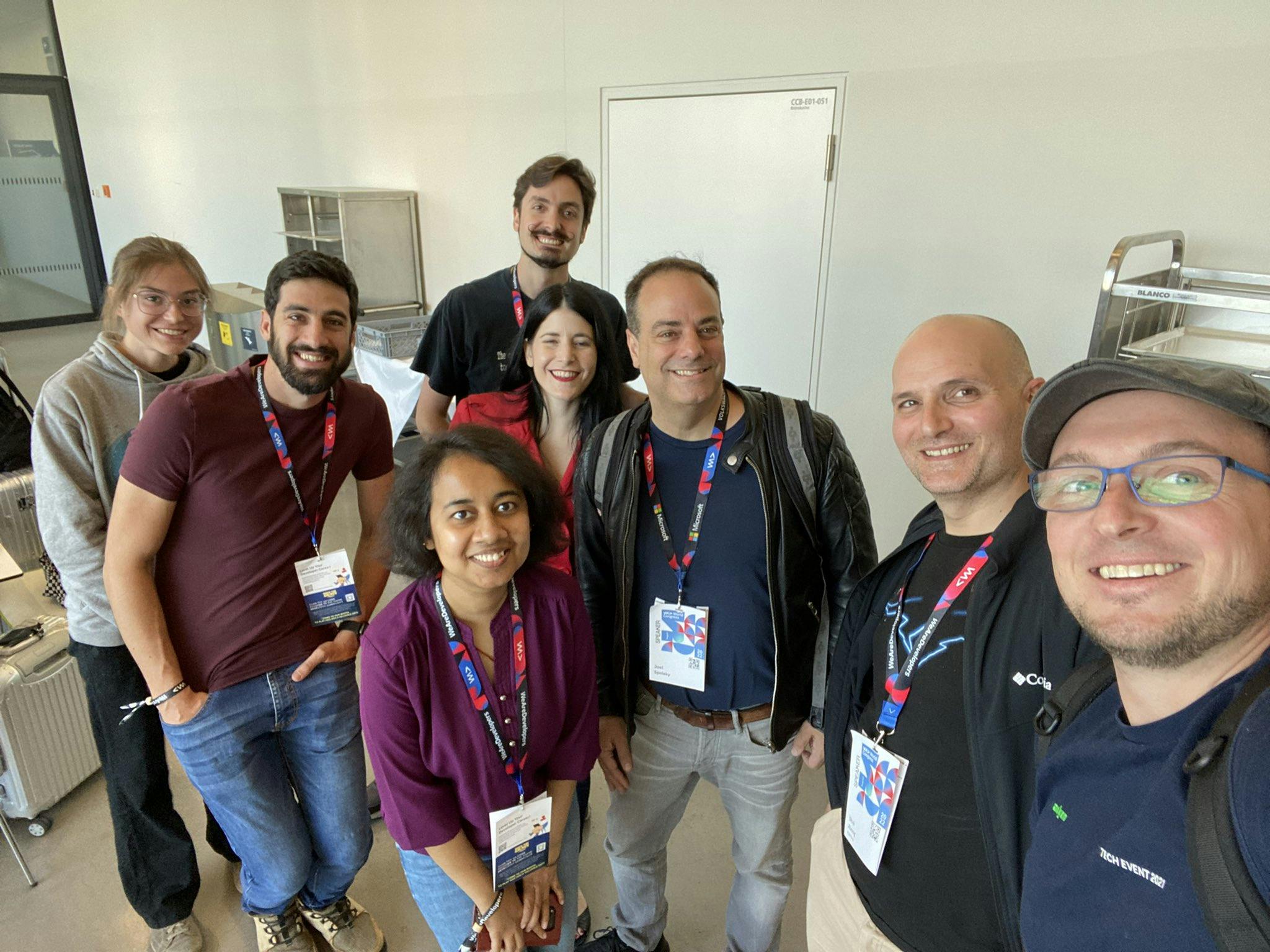
I attended his keynote right after that. He talked at a relatively high level about his new initiative blocks. The talk was interesting and well structured, I'm not sure if I fully "get it" yet. But with his track record I think it's very much something to keep an eye on.
C++ in constrained environments
I missed Bjarne Stroustrup's morning talk because it collided with mine and I missed half of his second talk because it collided with Joel Spolsky's keynote. I was able to grab the tail end of it from a distance as the hall was completely packed and overflowing. No standing room available.
What we Learned from Reading 100+ Kubernetes Post-Mortems
Next I met Yishai Beeri who was on his way to hear Noaa Barki's talk "What we Learned from Reading 100+ Kubernetes Post-Mortems". This was a great talk with a unique and engaging conversational structure.
She covered the Datree open source project which I heard of before but never really got a chance to dig into. Since I'm not a DevOps it might be a bit outside of my field anyway.
How to Optimize Non-Coding Time
The final talk of the day was from Yishai Beeri. He explored some of the ways in which the daily context switch essentially eats up our coding time and productivity.
He talked about various ways to cut that down to a reasonable overhead through automation of common tasks. E.g. skipping code review for small low risk changes.
Finally
Looking at the agenda I feel I missed so many great talks. But on the other hand I met so many people in the pavilion, speaker room and all around. On the day to day I enjoy the smaller more focused conferences that make it easier to get to know people. But these huge conferences are wonderful in a different way.
The force me out of my silo as a Java developer. I meet people from very different engineering backgrounds and get to see what "the rest of the industry" is excited about. Seeing the amount of people and crowds for each talk gave me a great sense of what people find interesting. I'm looking forward to next years event and will definitely submit a talk.

